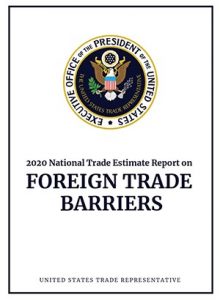
The Office of the U.S. Trade Representative (USTR) released its annual National Trade Estimate Report on Foreign Trade Barriers last month, highlighting significant challenges to U.S. exports including constraints the U.S. Grains Council (USGC) works to address in its export market development activities.
The Council has contributed comments for the report for more than a decade, focusing on trade barriers specific to U.S. coarse grains, co-products and ethanol.
“We believe that resolution of the broad range of barriers outlined in this report could bring about a correction in the coarse grain trade trends of the last decade, restore market access and allow U.S. producers and agribusinesses to effectively explore and capture new markets and business opportunities,” the Council wrote in comments submitted in October 2019. “The Council has worked cooperatively with USTR on a number of these issues. We look forward to continued collaboration.”
The national trade report, issued for at least the last 35 years, is a legally required annual submission to the President of the United States and the U.S. Congress. To produce the report each year, USTR asks for country-specific information on a wide range of tariff and non-tariff barriers, including:
• general and product-specific negotiating objectives;
• relevant barriers to trade in goods and services;
• economic costs and benefits to U.S. producers and consumers of removal or reduction of tariffs and non-tariff barriers;
• treatment of specific goods;
• customs and trade facilitation measures;
• sanitary and phytosanitary measures (SPS); and
• technical barriers to trade and other trade-related measures or practices that undermine fair market opportunities.
“This annual report on foreign trade barriers is used to identify existing and potential tariff and non-tariff barriers in specific world markets,” said Floyd Gaibler, USGC director of trade policy and biotechnology.
“This information is useful in addressing both persistent issues and emerging issues that require close cooperation between USTR and U.S. Department of Agriculture (USDA) officials and our overseas offices.”
Among the highest priority items for the Council are persistent non-tariff issues like biotech approval policies in the European Union and China. For example, the comments detail how after the introduction of biotech corn in the United States in 1996, market share for U.S. corn exports to the European Union dropped to single digits from an average of 63 percent between 1987 and 1996. Approval of these biotech corn events remains slow, meaning U.S corn exports continue to be much lower than previous levels – only 31,000 metric tons (1.22 million bushels) in 2018/2019. If the United States had maintained a 55 percent market share during that time, cumulative sales from 1997 to 2015 would have equaled more than 65 million metric tons (2.56 billion bushels).
SPS issues can also be trade-inhibiting, like restrictive fumigation protocols on the export of U.S. dried distiller’s grains with solubes (DDGS) to Vietnam, restrictive tariffs in the Philippines and a lack of phytosanitary protocols to export products like barley into China.
In addition to contributing to the USTR report, these comments help provide input for the Council’s Trade Policy Advisory Team (A-team) and for developing trade policy strategies for the Council’s operational blueprint, the Unified Export Strategy (UES). These comments also contribute to the Council’s participation in the USDA’s Grains and Oilseeds Agricultural Technical Advisory Committee (ATAC).
“These comments provide a foundation for formulating objectives for new trade agreements or deals or addressing issues through international bodies like the World Trade Organization,” Gaibler said. “The collaboration between USTR, USDA and organizations like the Council demonstrate the ability of these private-public partnerships to keep trade flowing.”
About The U.S. Grains Council
The U.S. Grains Council develops export markets for U.S. barley, corn, sorghum and related products including distiller’s dried grains with solubles (DDGS) and ethanol. With full-time presence in 28 locations, the Council operates programs in more than 50 countries and the European Union. The Council believes exports are vital to global economic development and to U.S. agriculture’s profitability. Detailed information about the Council and its programs is online at www.grains.org.
